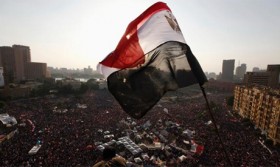 Opposition figures, activists and military leaders have been offering their preferences for the post of prime minister during Egypt’s second transition period since the 25 January Revolution.
Opposition figures, activists and military leaders have been offering their preferences for the post of prime minister during Egypt’s second transition period since the 25 January Revolution.
It is not easy, government officials said, to choose a prime minister after a popularly-supported army intervention – the word coup d’état is rejected by the masses that joined the 30 June demonstrations against Mohamed Morsi.
Former prime minister Kamal Ganzouri, former central bank governor Farouk Oukda, current central bank governor Hesham Ramez and former minister of technology Ahmed Darawish are, according to sources, on a shortlist of contenders for the job that would actually be the top executive position because the presidential position is ‘honorary’.
Other names proposed for the job include Hani Sarieddine and Ziyad Bahaeddine, but their partisan affiliations reduce their chances because the army is “very careful not to come across as having extracted power from one party to pass it on to another,” an official said.
“Within the next 24 hours or so a new prime minister will be announced and he will be asked to select cabinet members,” said one official source late on Thursday.
Within the army
Selecting a prime minister is one of the easiest parts of the transition that started on Wednesday when Defence Minister Abdel-Fattah El-Sisi, joined by opposition and religious leaders, activists and military top brass, announced Morsi’s removal and the suspension of the constitution.
Official sources said securing the composition of an efficient government, which must deal with daunting economic challenges, is only matched by the pressing need to secure a process that does not indicate any “unintentional” setback on the path of democracy.
“It is very tricky because Morsi was actually elected, but he lost the faith of the nation during a year of endless hiccups, economic and political. But it was impossible to overlook the massive anger and the information we had about his plans that would have destabilised the country,” said an intelligence source.
According to the source, Morsi had planned to create “splits within the army,” “take measures to quell the liberal media” and “use mosques to start incitement against his opponents”.
“If you add to this the massive frustration over economic deterioration, and the mismanagement – I could actually say more – of national security matters, then you would see that it was impossible to wait for long. The army acted upon the will of the people and in line with serious national security matters which will be revealed in due time.”
Revealing the harm to national security committed by Morsi and the Muslim Brotherhood will end the concerns that some in the West have regarding recent events, the source added.
Morsi, now under house arrest in a ‘safe’ venue, and some Brotherhood figures complained publicly about being subjected to a military coup – with Essam El-Haddad, the foreign affairs advisor, calling for foreign troops to protect the president.
El-Sisi attempted to avoid coup allegations by delivering his statement deposing Morsi alongside civil, religious and political figures– including a Salafist leader. He also announced a transition plan with a clear timetable and elections.
Western concerns
Major world capitals, especially Washington, are concerned about the military’s role in Morsi’s removal. According to Western diplomats in Cairo, they are waiting to see the political transition plan and regulations governing freedoms and economic life.
“Offering a clear scheme on these three matters is essential for gaining the support of the international community,” said one diplomat. The assurances offered by the current rulers in Cairo that the closing of some Islamist TV channels and the arrest of Brotherhood leaders are only part of a temporary security scheme are “not exactly reassuring,” he added. “We are really worried about extra-judicial measures.”
The international community is not united about recent developments in Egypt. The US is concerned and has said it will have to decide whether to continue sending the country military aid.
“Threats to suspend military aid were made to El-Sisi by his American counterpart, but we trust that when the dust settles the US will realise that the military leadership had no choice but to bow to the demands of the masses. The military could not have turned their back on the masses nor was it possible for them to coerce the demonstrators as Morsi had demanded of the ministries of interior and defence,” the intelligence source said. He added that the issuance of a transition plan would help in this respect.
According to the same source, issuing the transition plan would also stop the US vetoing a Saudi plan for “rapid financial aid to Egypt.”
Arab and Western diplomats said Saudi Arabia and the United Arab Emirates were ‘influential’ in encouraging Washington not to accept the advice of its ambassador in Cairo to issue a critical statement about “a military coup against a democratically elected president.” They continue to lobby the US support to Egypt and they are having some success, the same sources said.
Other quarters planning to support Cairo include Moscow and Beijing, which have, according to one source, been using their weight in Africa to combat a motion by some US allies in the continent to suspend Egypt’s membership of the African Union.
“We cannot say we have the support that we’d hoped for,” an Egyptian military source said. “We know the Turkish and Tunisian leaderships are demanding Morsi’s reinstatement as president, even in a symbolic set up. We know the Egyptian people are opposed to this and we will only follow the will of the people, but we have to remain vigilante.”
He added, “The coming days and weeks are going to be tough but once we have an electoral law, hopefully by the end of the summer, and start moving towards parliamentary elections, then we should be on the right track.”
